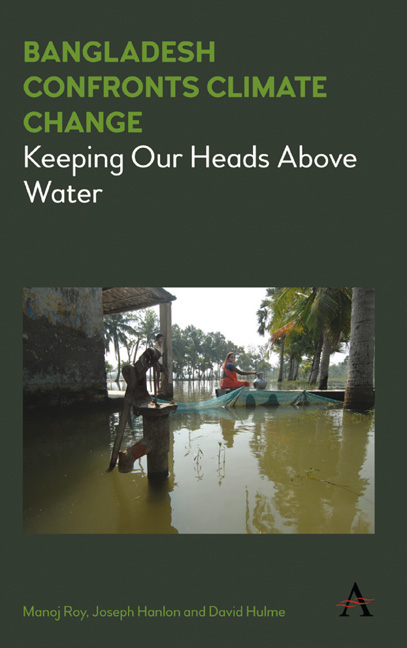Book contents
- Frontmatter
- Content
- List of Illustrations
- Abbreviations, Acronyms and Bangladeshi Terms
- Acknowledgements
- About the Authors
- Chapter One Actors, Not Victims
- Chapter Two How Will Climate Change Hit Bangladesh?
- Chapter Three Taking the Lead in Negotiations – and Moving Forward
- Chapter Four Sea Level Rise and the Vulnerable Coast – Where Farmers Know More than Engineers
- Chapter Five Saving Lives with Cyclone Shelters
- Chapter Six Living with Floods
- Chapter Seven Agronomists Keeping Ahead of Climate Change
- Chapter Eight No Climate Change Migrants – Yet
- Chapter Nine How Can the Privatized Megacity Cope with Climate Change?
- Chapter Ten Is Climate Change Only a Problem for the Urban Poor?
- Chapter Eleven Power – Political, Financial and Electrical
- Chapter Twelve Bangladesh on the Front Line of Climate Change
- Index
Chapter Twelve - Bangladesh on the Front Line of Climate Change
Published online by Cambridge University Press: 22 July 2017
- Frontmatter
- Content
- List of Illustrations
- Abbreviations, Acronyms and Bangladeshi Terms
- Acknowledgements
- About the Authors
- Chapter One Actors, Not Victims
- Chapter Two How Will Climate Change Hit Bangladesh?
- Chapter Three Taking the Lead in Negotiations – and Moving Forward
- Chapter Four Sea Level Rise and the Vulnerable Coast – Where Farmers Know More than Engineers
- Chapter Five Saving Lives with Cyclone Shelters
- Chapter Six Living with Floods
- Chapter Seven Agronomists Keeping Ahead of Climate Change
- Chapter Eight No Climate Change Migrants – Yet
- Chapter Nine How Can the Privatized Megacity Cope with Climate Change?
- Chapter Ten Is Climate Change Only a Problem for the Urban Poor?
- Chapter Eleven Power – Political, Financial and Electrical
- Chapter Twelve Bangladesh on the Front Line of Climate Change
- Index
Summary
The Bangladesh Rice Research Institute is developing salt and flood tolerant rice. The national government is building new cyclone shelters. BRAC University architects are designing stronger houses. Climate change is already happening and most studies point to Bangladesh as one of the most vulnerable countries. But it is refusing to be a victim; Bangladesh is not standing by helplessly, waiting for others to act. Instead it is already adapting to climate change and is playing a leading international role in building pressure to halt global warming.
Bangladesh confronts climate change from a basis of knowledge and experience. It has always had an unusual position. It is the world's most densely populated country because it is a rich delta and feeds itself. But that natural wealth has costs in floods and cyclones and a hugely variable climate – which, over centuries, have also made Bangladeshis masters at adaptation. For Bangladesh, climate change does not create new and catastrophic problems – it will not entirely disappear beneath the sea or have huge areas transformed to desert, as will happen in some countries. But nearly one-third of the country is less than 3 m above sea level and the sea is rising; cyclones can kill thousands and all forecasts are that they will get worse; rainfall and flooding will be greater due to global warming. In the country's towns and cities there are likely to be dramatic changes that are not yet understood.
In two different ways, Bangladesh is on the front line of climate change. First, it is highly vulnerable. But second, its history of dealing with an extremely complex and difficult climate made it one of the first to understand the implications of climate change. Climate change was not some theoretical future problem, and Bangladeshis could see what the impact of global warming would be on their country. This led to international campaigning from 1990, and Bangladeshi scientists and intellectuals have been playing a leading role in international negotiations for the past two decades. Inside Bangladesh it led to early consideration of how existing programmes to meet climate problems could be adapted and accelerated to deal with climate change.
- Type
- Chapter
- Information
- Bangladesh Confronts Climate ChangeKeeping Our Heads above Water, pp. 161 - 168Publisher: Anthem PressPrint publication year: 2016



